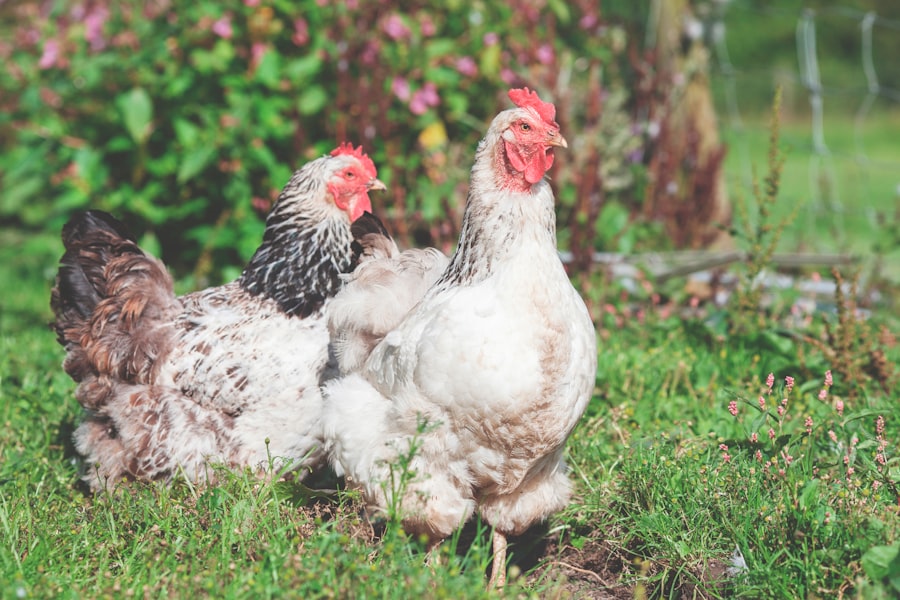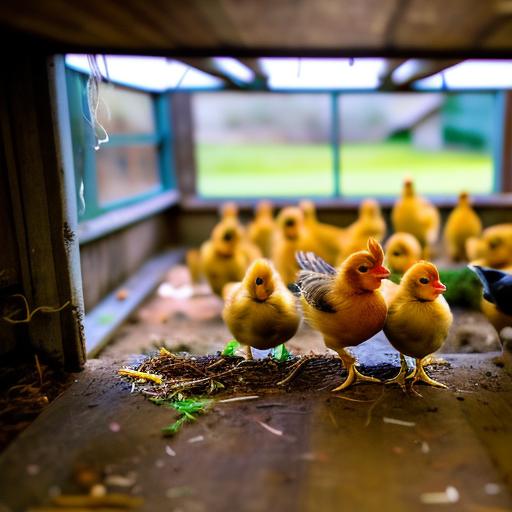Keeping baby chickens in the house has become a growing trend among backyard chicken keepers. While traditionally chickens were kept in outdoor coops, many people are now opting to bring these adorable creatures indoors. This article will explore the advantages and disadvantages of keeping baby chickens in the house, as well as provide tips for choosing and maintaining a chicken coop. Whether you are considering getting baby chickens as pets or for educational purposes, it is important to carefully consider whether this is the right choice for you.
Key Takeaways
- Keeping baby chickens in the house has advantages such as providing fresh eggs and teaching children responsibility.
- Disadvantages of keeping baby chickens in the house include noise, mess, and potential health hazards.
- Choosing the right chicken coop for baby chickens involves considering size, ventilation, and predator protection.
- Factors to consider when building a chicken coop for baby chickens include location, materials, and ease of cleaning.
- Essential features of a chicken coop for baby chickens include nesting boxes, roosting bars, and a secure door.
Advantages of Keeping Baby Chickens in the House
One of the main advantages of keeping baby chickens in the house is the companionship they provide. Chickens are social animals and can form strong bonds with their human caretakers. They enjoy being held and cuddled, and can provide a great deal of comfort and entertainment. Having baby chickens in the house can also be a wonderful learning experience for children. They can learn about responsibility, empathy, and the life cycle of animals by caring for these adorable creatures.
Disadvantages of Keeping Baby Chickens in the House
While there are many advantages to keeping baby chickens in the house, there are also some downsides to consider. One of the main disadvantages is the noise and mess that chickens can create. Chickens are not known for being quiet animals, and their constant clucking and crowing can be disruptive, especially if you live in close proximity to neighbors. Additionally, chickens can create quite a mess with their droppings and feathers, which can be difficult to clean up.
Another potential disadvantage of keeping baby chickens in the house is the health risks associated with indoor chicken keeping. Chickens can carry bacteria such as Salmonella, which can be transmitted to humans through contact with their feces or by handling them. It is important to practice good hygiene when handling chickens and to thoroughly wash your hands after touching them or cleaning their coop.
Choosing the Right Chicken Coop for Your Baby Chickens
When keeping baby chickens in the house, it is important to have a suitable chicken coop for them to live in. A chicken coop provides a safe and secure environment for your chickens, as well as a place for them to sleep, eat, and lay eggs. There are different types of chicken coops available, including pre-made coops and DIY options. It is important to choose a coop that is the right size for your baby chickens and provides adequate ventilation.
Factors to Consider When Building a Chicken Coop for Baby Chickens
When building a chicken coop for baby chickens, there are several factors to consider. First, you need to determine the size of the coop based on the number of chickens you plan to keep. It is recommended to provide at least 4 square feet of space per chicken. Additionally, the coop should have proper ventilation to ensure good air circulation and prevent the buildup of ammonia from chicken droppings.
Another important factor to consider when building a chicken coop is the location. The coop should be placed in an area that is protected from predators and has good drainage. It should also be easily accessible for cleaning and maintenance.
Essential Features of a Chicken Coop for Baby Chickens

A chicken coop for baby chickens should have several essential features to ensure their comfort and well-being. One important feature is nesting boxes, where the chickens can lay their eggs. These boxes should be dark and secluded to provide privacy for the hens. Another essential feature is roosting bars, where the chickens can perch at night. These bars should be placed higher than the nesting boxes to prevent chickens from sleeping in them.
In addition to nesting boxes and roosting bars, a chicken coop should also have adequate food and water sources. Chickens require fresh water and a balanced diet to stay healthy. It is important to provide clean water and a balanced chicken feed that is appropriate for their age and breed.
Tips for Maintaining a Clean and Healthy Chicken Coop in the House
Keeping a clean and healthy chicken coop is essential for the well-being of your baby chickens. Regular cleaning and disinfecting of the coop is important to prevent the buildup of bacteria and parasites. It is recommended to clean the coop at least once a week, removing any soiled bedding and replacing it with fresh bedding.
Monitoring your chickens for signs of illness is also important. Chickens can be susceptible to various diseases, such as respiratory infections and parasites. It is important to observe your chickens closely and seek veterinary care if you notice any signs of illness, such as lethargy, loss of appetite, or abnormal droppings.
Common Mistakes to Avoid When Keeping Baby Chickens in the House
There are several common mistakes that people make when keeping baby chickens in the house. One common mistake is overcrowding the coop. Chickens need space to move around and exercise, so it is important to provide enough space for them to roam freely. Overcrowding can lead to stress, aggression, and an increased risk of disease.
Another common mistake is improper ventilation in the coop. Good ventilation is essential to prevent the buildup of ammonia from chicken droppings, which can be harmful to their respiratory health. It is important to provide adequate airflow in the coop by installing windows or vents.
Preparing Your House for Baby Chickens
Before bringing baby chickens into your house, there are several steps you need to take to prepare your home. First, you will need to set up a brooder, which is a warm and safe space for the baby chickens to live in until they are old enough to move into a coop. The brooder should be equipped with a heat lamp or heating pad to provide warmth for the chicks.
It is also important to protect your floors from the mess that chickens can create. You can use materials such as straw or wood shavings to line the floor of the brooder and prevent damage to your floors. Additionally, you may want to consider placing a plastic sheet or tarp underneath the brooder to catch any spills or droppings.
Is Keeping Baby Chickens in the House Right for You?
In conclusion, keeping baby chickens in the house can be a rewarding experience, providing companionship and entertainment. However, it is important to carefully consider the advantages and disadvantages before making the decision to bring chickens into your home. It is important to provide a suitable chicken coop that meets the needs of your baby chickens and to maintain a clean and healthy environment for them. By taking these factors into consideration and following proper care guidelines, you can enjoy the benefits of keeping baby chickens in your house.
If you’re considering keeping baby chickens in your house, you may also be interested in learning about the importance of providing a suitable coop for your feathered friends. A well-designed chicken coop, like the SnapLock Chicken Coop featured in this article, not only provides a safe and secure environment for your chickens but also ensures their comfort and well-being. To find out more about how big a coop needs to be for a chicken, check out this informative article.
FAQs
Can I keep my baby chickens in the house?
Yes, you can keep baby chickens in the house, but it is not recommended for long-term housing.
What are the benefits of keeping baby chickens in the house?
Keeping baby chickens in the house can help protect them from predators, provide easier access for care and monitoring, and can be a fun and educational experience for children.
What are the drawbacks of keeping baby chickens in the house?
Keeping baby chickens in the house can create a mess and odor, can be noisy, and can pose health risks to both the chickens and humans due to the accumulation of dust and dander.
What do baby chickens need to thrive in the house?
Baby chickens need a warm and dry environment, access to food and water, proper ventilation, and adequate space to move around and exercise.
How long can baby chickens stay in the house?
Baby chickens can stay in the house for a few weeks to a few months, depending on their age and size. It is important to transition them to an outdoor coop as soon as possible to ensure their long-term health and well-being.
What should I consider before keeping baby chickens in the house?
Before keeping baby chickens in the house, consider the space and resources you have available, the potential health risks, and the long-term housing needs of the chickens. It is also important to check local laws and regulations regarding keeping chickens as pets.
Meet Walter, the feathered-friend fanatic of Florida! Nestled in the sunshine state, Walter struts through life with his feathered companions, clucking his way to happiness. With a coop that’s fancier than a five-star hotel, he’s the Don Juan of the chicken world. When he’s not teaching his hens to do the cha-cha, you’ll find him in a heated debate with his prized rooster, Sir Clucks-a-Lot. Walter’s poultry passion is no yolk; he’s the sunny-side-up guy you never knew you needed in your flock of friends!







